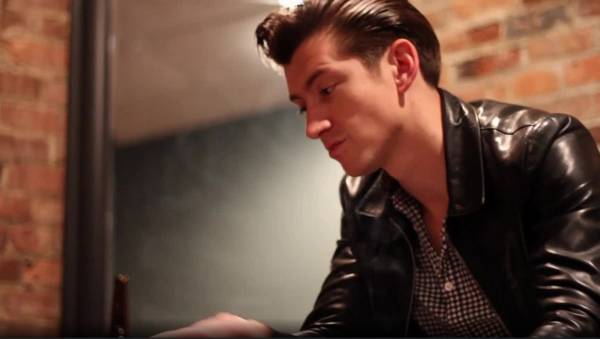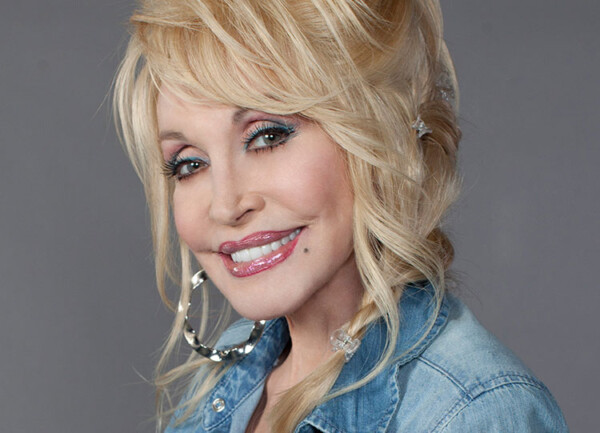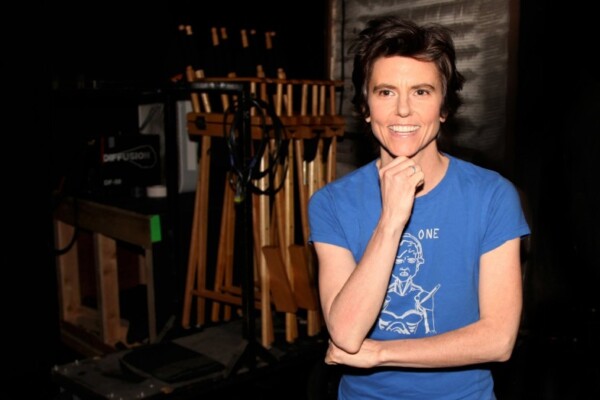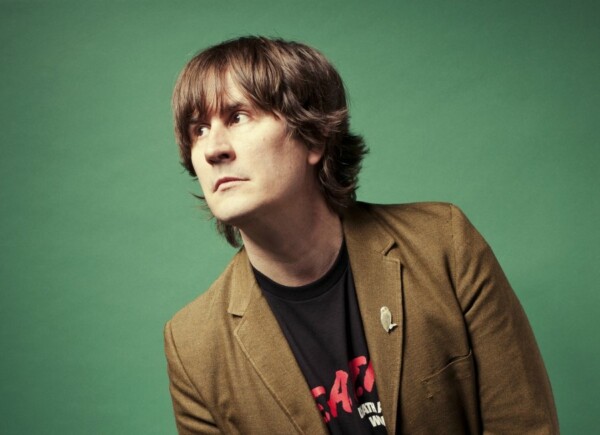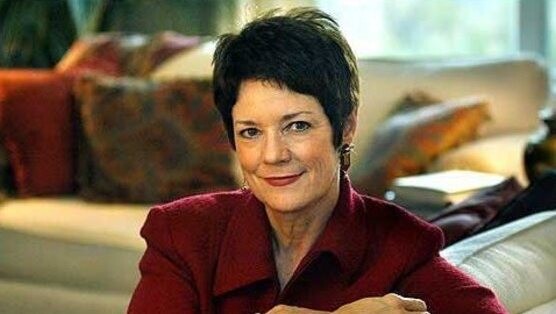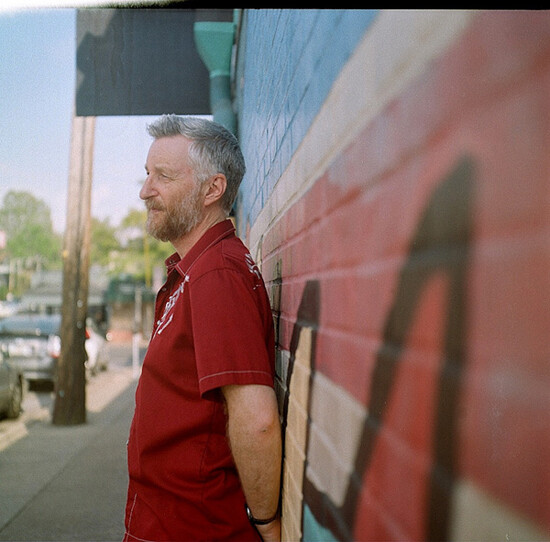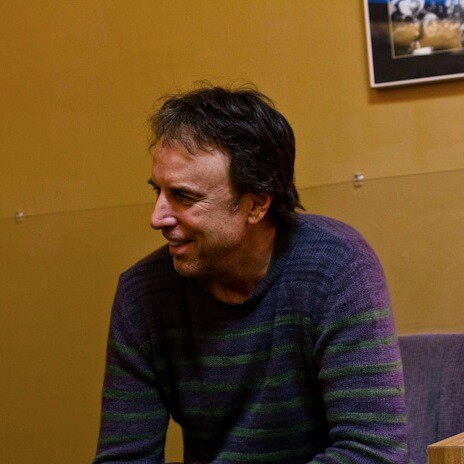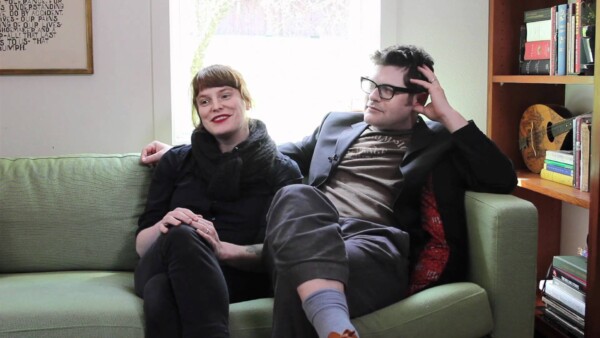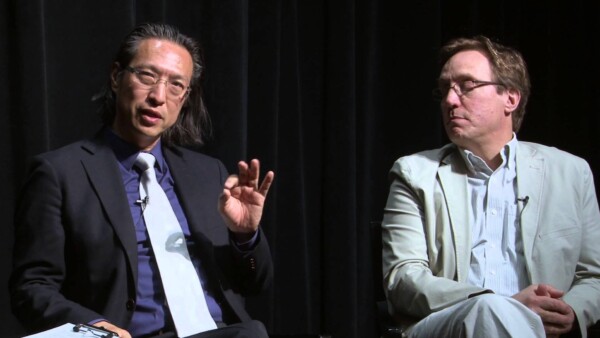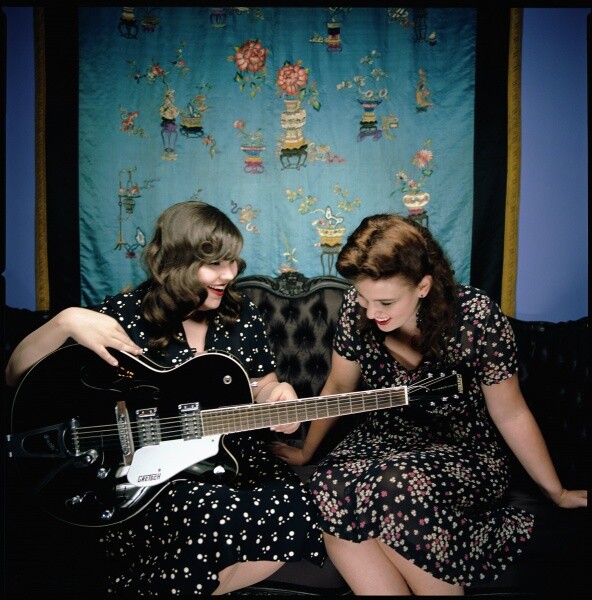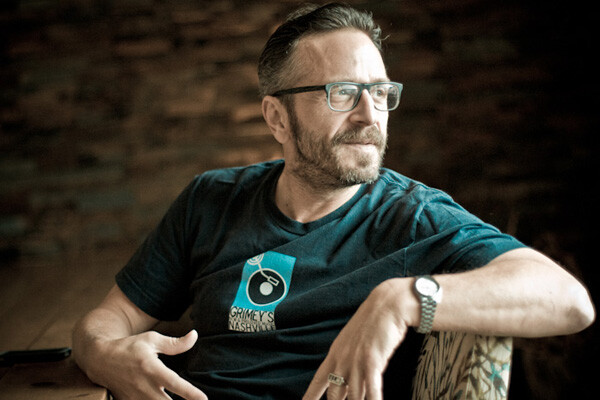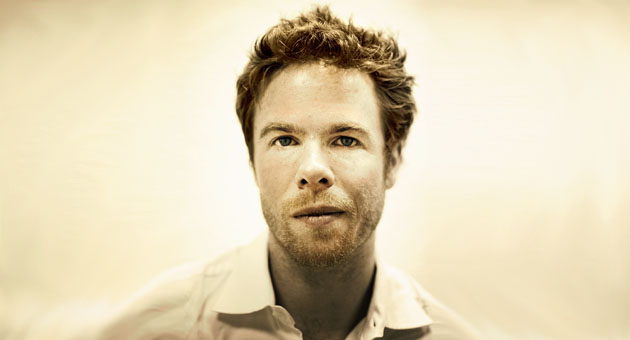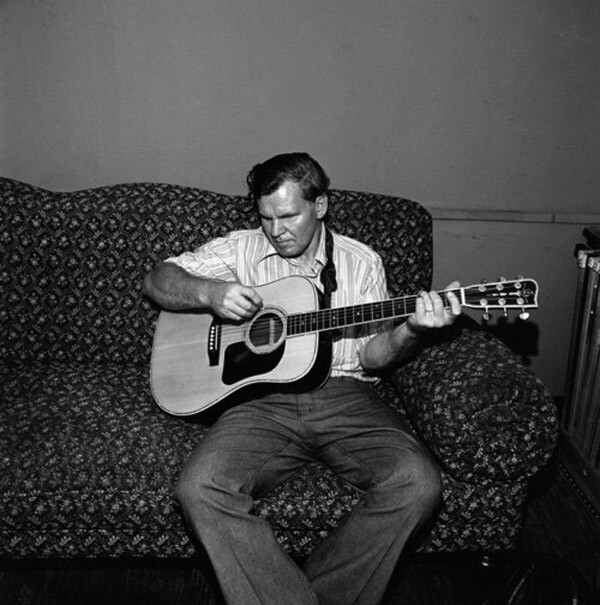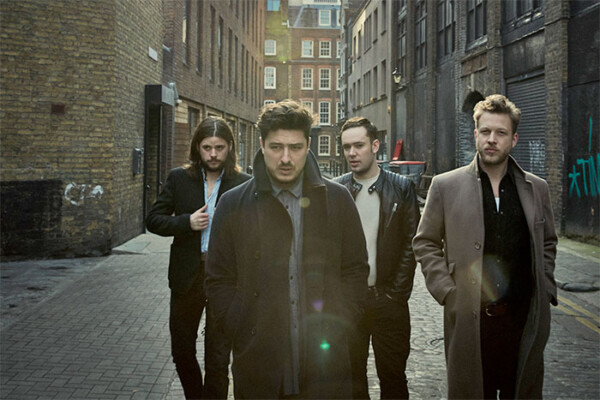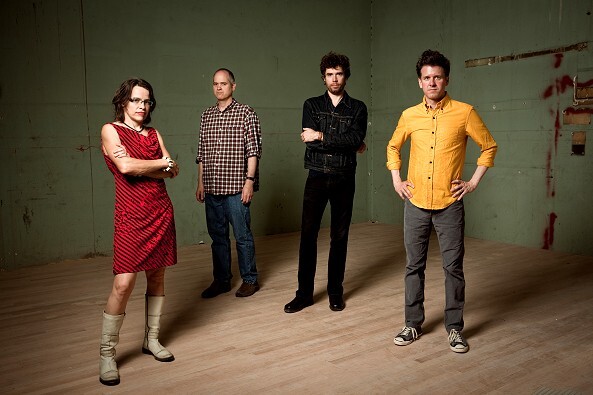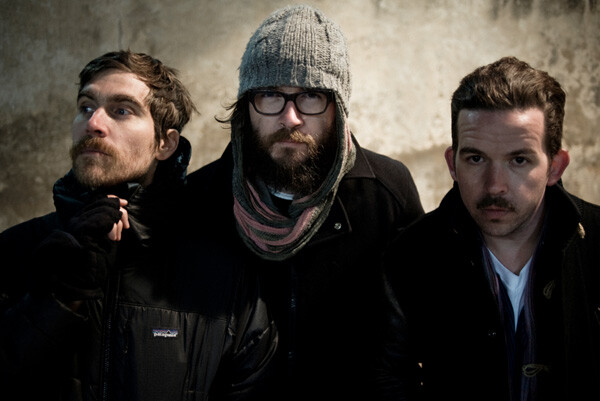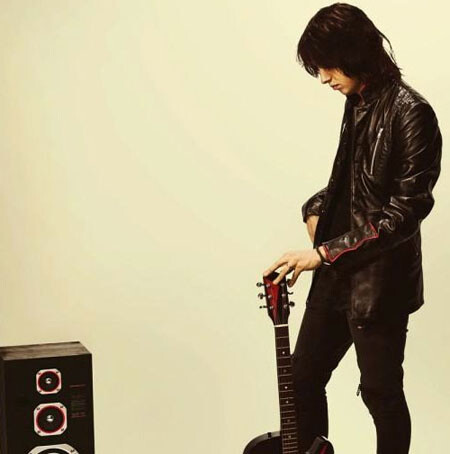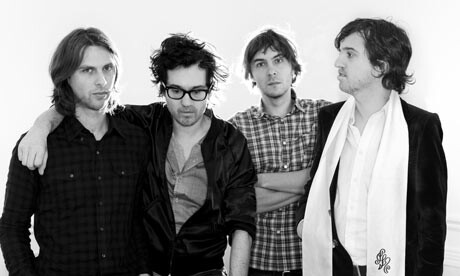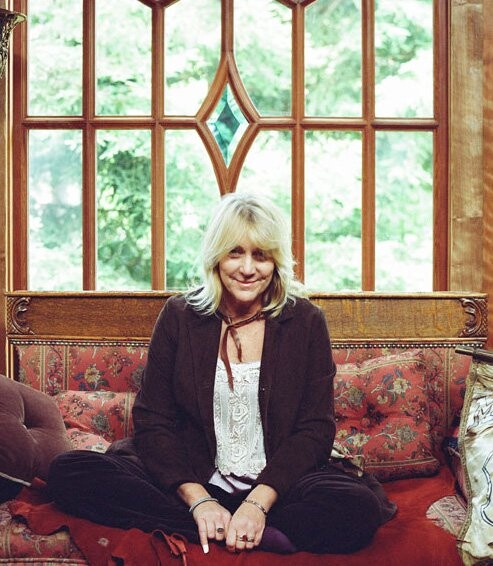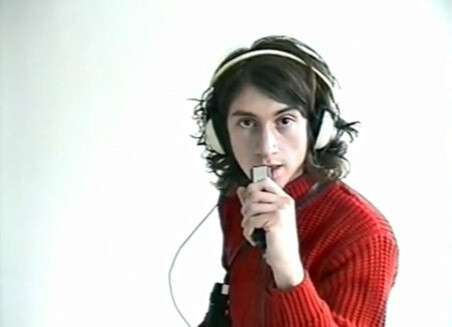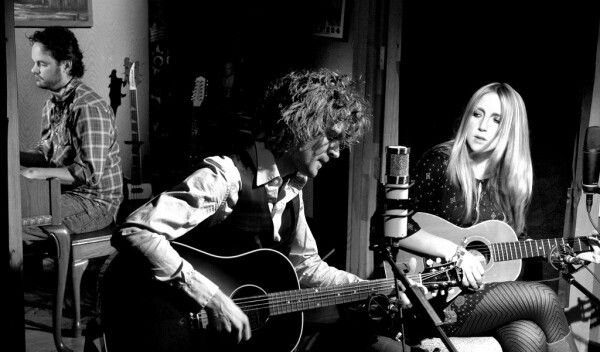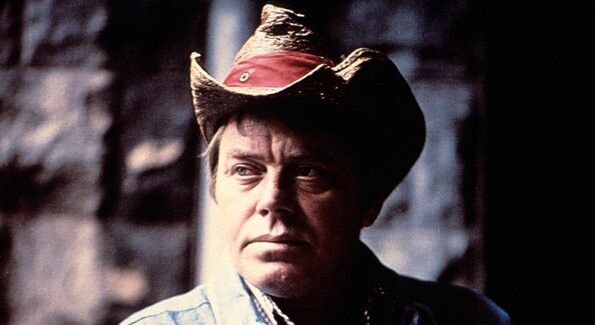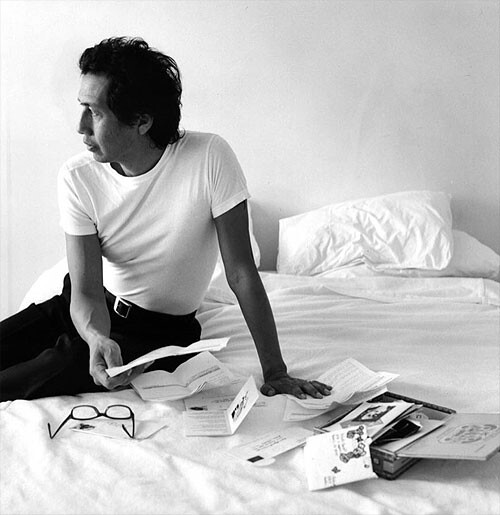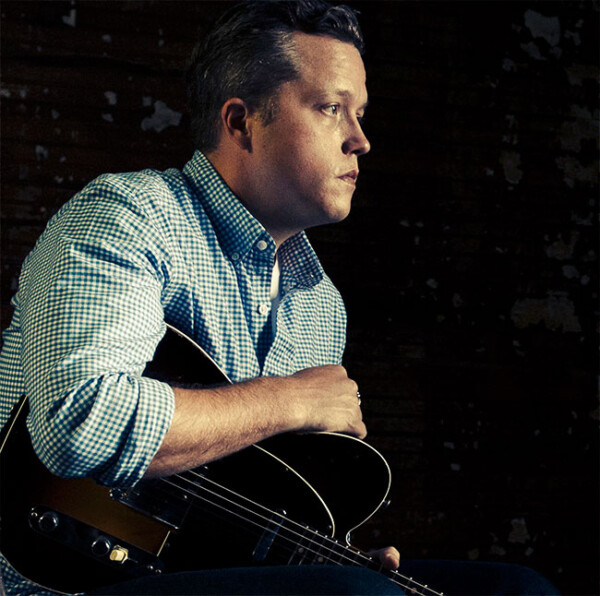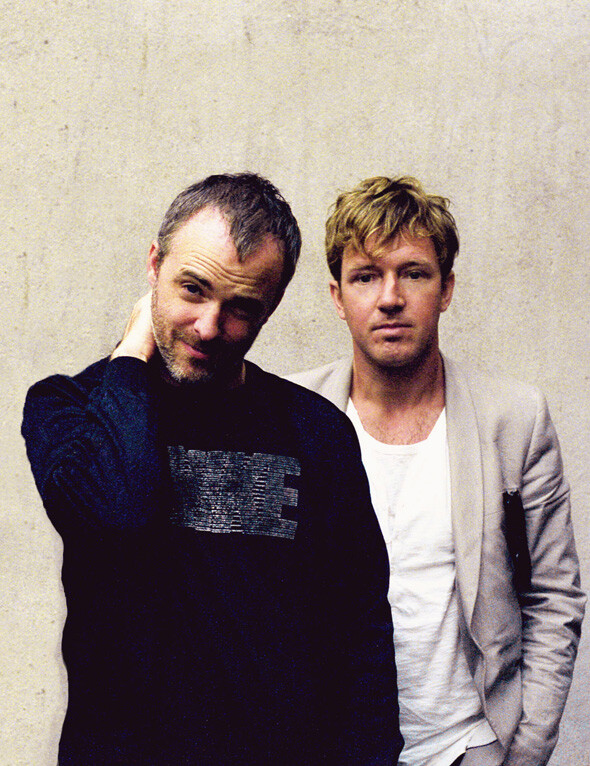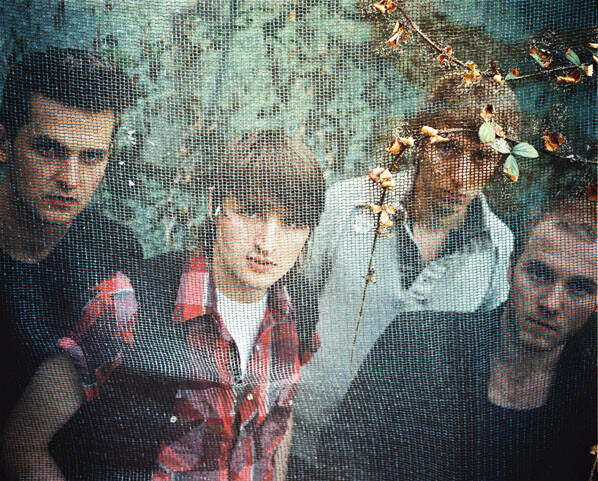Skip Matheny— currently a songwriter in the band Roman Candle and former bartender in a retirement community — recently caught up with Marcus and Winston from Mumford & Sons in Knoxville, Tennessee, while the band was on their sold out U.S. tour supporting their debut album Sigh No More. Adding to the momentum they have already generated in the U.S. and in Europe, they also recently received two Grammy nominations for Best new Artist and Best Rock Song ( “Little Lion Manâ€).
Skip’s note: Special thanks to Marcus and Winston who sat outdoors in 30 degree weather to answer these questions. Winston especially, who had just finished playing football, managed to chat for roughly 45 minutes in shorts and a t shirt. Like Glassnote label-mates Phoenix, the four band members knew each other long before they started making music together, and to me at least, it seems apparent in everything they do, from their writing process, live performances, to the way they chat with each other, etc.
What’s your favorite drink?
Winston: I’ve got two personal favorites. Coca Cola from a glass bottle. Not Coca Cola from the tap or from the can. Specifically cold, from the fridge, from a glass bottle. Not within a glass of ice.
Marcus: Do you know apparently they use cane sugar for the bottles and corn syrup for the cans.
W: It’s a different kind of sugar they use.
I’d heard something like that, depending on which region its bottled in. It’s a big difference.
W: Yeah, it is. That and Lagavulin.
M: I’m a Scotch man. I love Talisker. I like Glenlivet. I went to a distillery with my parents when I was probably 11 years old. And I remember the smell was so vivid. It’s weird how memories like that just stick out. The Edradour Distillery in the Highlands and we brought back little miniatures. I remember my parents let me just touch it to my lips. (laughs) That was it.
The dynamics in your songs are really well defined, and cover a pretty broad range from super soft to very large or anthemic, across the span of a single song. Like for example in “White Blank Pageâ€. How did these broad dynamic shifts develop in your songs? Did it come out of playing them live? Or were they there in the writing stages?
M: I think it grew out of sitting in a room together, and really writing it together. We tend to write in fragmented stages. So we’ll have a verse sometimes, and we’ll match it up with someone else’s chorus.  But in that one, I had the verse and the chorus but then the “aaahhs†at the end, that become half the song really. We wrote in the studio and when we were rehearsing. Our first rehearsal pretty much. And that sort of came about. So yeah, there wasn’t an idea to do like a sort of vocal harmony thing.  We hadn’t even started harmonizing during the time that I was writing that song;, we went in and started singing it together and then we thought let’s make a thing in the vocals here, because it sounds sort of nice to us.
That’s interesting. The soft verse, loud chorus pattern within a song goes way back in rock and roll, but I was wondering if, in your case, it had been done on a conscious level. You’re use of those dynamics are obviously a bit more unpredictable than a typical rock band’s. And it’s not just dynamics that get bigger, it’s the harmonies. Did those types of details come naturally when you all started playing together?
M: Yeah. It was kind of natural.  But it’s also conditioned in us from the music that we were listening to while we were growing up and around that time. It was a time when I was just getting quite seriously into country music and bluegrass. The vocals of Old Crow Medicine Show made me think, “Wow, if five dudes can sing together like that — amazing.†But yeah, having grown up listening to classic rock and even choir music, you are aware of the idea of harmony. But then finding the dudes that it actually sounds right with is quite a difficult thing.
Yeah, It can be a weird, mystical thing to find people that you sing well with.
M: It doesn’t always work with groups of people. When we sat down, the four of us, and we all open our mouths and sing, to our ears, it just started working quite quickly.  Cause we have quite different voices. Ted’s got a really gravelly bluesy, type voice in a certain register, Winnie’s got more of a country voice in a different register, and then Ben’s above that.  Ben has a more technical approach to harmony. Me, Win and Ted will kind of vibe it out about whatever sounds best, whereas Ben will figure out who is gonna sing the sixth or whatever.
When did you start writing the songs that are on Sigh no More?
M: I think that was the first one, “White Blank Page.â€Â That and “Awake My Soul†we did at the same time. Same couple of days. And then we had three or four other songs that didn’t make it on to the record, but that we were just playing. One of which we sometimes still play live. It’s called “Feel the Tideâ€.  And then the rest of them really came on the road. They came when we started touring.
W: Mumford and Sons’ first tour was April 2008. And we did two and a half weeks, scattered back and forth.
M: (To Winston) We didn’t do a support tour, first did we?
M: We did a lot of support slots in London.
W: Yeah, we did six months doing supports.
M: And that was the summer of 2007, when we really didn’t have any songs. We’d only pay covers and we’d just sort of jam out.  We had “ideas†for songs.
M: But “White Blank Page†I think we played live at Monkey Chews (in London) and that was October 2007.  And Holly, now married to my brother, she was singing with us at the time, and the fiddle player who wrote the fiddle part, he was playing the set as well.
When you say you started to get into bluegrass, what was some of the first bluegrass that you stared to get into?
M: Well Winnie was the first to get into bluegrass. Actually we were just talking today about how O Brother Where Art Thou was like a critical moment for us.
W: It had such a big influence. It was huge, obviously, around the world. but the soundtrack was…I think everyone owned it. Did you?  All my family had a copy.
All of my friends family and in-laws had it. Best Christmas present ever that year.
W: Exactly. When was it? 2001? I don’t remember what year it was, but everybody bought it two or three times, it was just one of those records.
It always used to be in whatever car you ended up in. Or at least it used to be.
W: Yeah. Not so much any more.  And like “Man of Constant Sorrow,†I think we must have played that a bunch of times in the start.
M: And it was really cool. Â Because no one [our age] was listening to it.
W: So when you found others that were listening to it, you felt more of a kinship.
M: I remember around that time my brother was at college with a guy who made me a mix tape with Alison Krauss and Gillian Welch an Old Crow Medicine Show on it, and a couple songs from that soundtrack as well.  And that was when I first discovered Gillian and Old Crow. Winnie and I bonded over Old Crow really early on. Yeah, I mean, bluegrass is one of many influences. We end up talking about it a lot at the moment, because we’re playing with lots of guys who are involved in bluegrass, but I wouldn’t say it was the one influence that made us start a band. I’ve been an Arcade Fire freak for a long time.  That first record I listened to the year after I finished high school, and it was all I listened to for like eight months. Put that stuff together with all of the stuff your parents sit you down to listen to when you are younger, or what your brothers or sisters play for you. And what you were playing when you played rock stuff at school.  Ben and I were playing a lot of jazz together from the age of about 12. So when you put all of those things together, it’s kind of funny, how it works.
Lyrically, a lot of the songs seem to be dropping in on a really charged moment, a really raw moment. People aren’t sitting around drinking orange juice and flipping through a magazine in your songs. It’s more like the listener is dropping in on people who are experiencing profound heartbreak or disappointment, or love in some moment of failure. When you all were sitting down and you started to write songs, and things were starting to take shape, was there a conscious move towards these things in the lyrics?  Were you keeping things away, or did you take things and say “this fits the whole thing, this doesn’t,†or did you just write what came out?
W: Usually lyrics don’t come when we are all together. They often come before, in a personal moment.  And always, each song is different, either greatly different, or just quite a little bit different. Probably the moment that they come in is what we try and make the song sound like. The feeling that you have when the song originally comes is what the rest of us try and do, to make that song feel like ….
M: That initial moment or intention.
W: Yeah. Â Either complimenting the lyrics to create that or, you know, creating a frame for the lyrics.
M: It’s funny , when we were writing “Little Lion Man,†I think these guys were aware that I had a certain amount of aggression that I was venting through that song.  And it’s like everyone else takes that on board.
W: Yeah, exactly. That’s the “thrashiest†song we play.
M: Yeah. And then, when we were doing “Winter Winds†which Winston wrote it was the winter, and we were huddled around and we were aware of how he was feeling at the time and we stood around in this circle in Ben’s kitchen and just sang together for about three hours, pretty much just that chorus. Over and over again.  And there was like a sort of… I guess there was a sense of triumph in it, mixed with the other things that he was feeling. We never even mentioned but sort of understood.
I think that’s because we were all friends before we were a band. We knew each other and “got†each other before we started touring. So I don’t think we have ever had a conversation about what we want the lyrics of Mumford & Sons to be about ever. We just sort of understand it. I think it’s also because we are quite English (laughs) and the idea of talking about our emotions is sort of not cool.
No, I do not advocate that at all (laughs).
M: No, you don’t sit there going “this is how I’m feeling. I’ve written this song…†(laughs) There are bits in the songs where one of us will be like ‘what do you mean?’  And that’s good because we challenge each other not to be lazy lyrically. But I don’t think anyone has ever sat anyone else down and gone, “Now what is this song about?â€
W: We kind of live inside each other’s pockets as well.  We know what we’re all doing.  There aren’t too many… I mean someone wouldn’t just come out of the woodwork with a song about how they want to become a footballer without us already kind of getting what they meant.
M: One conversation that I remember is when Ben and I were sitting with a piano and guitar and we were working at the skeletal verse and chorus for “Dust Bowl Dance.†We were sitting and I remember he came with these chords and I said “Alright, let’s try to write something around that. Those are great chords.  And I’d just finished Grapes of Wrath and was feeling pretty ‘wrathful’ (laughs).  And I remember we talked about what the chorus should be about. Yeah that was it really.
W: It just goes to show that every song is different.
Any favorite authors or poets that may or may not have influenced your writing?
M: I’m really enjoying G.K Chesterton at the moment, still.
I actually thought of him the first time I heard your record, because the way in which he talks about ‘exhortation’ between friends in Orthodoxy.
M: Well, I really want to get into Orthodoxy but right now I want to read these three chapters my brother recommended from Everlasting Man. Because I love classical History and I love medieval History, and have studied it a bit he kind of goes through that stuff, and then comes through to the more modern era. Obviously you study a lot of Shakespeare if you are an English schoolboy or girl. But growing up with King Lear was quite a big thing for me, as well as Macbeth. But I studied T.S. Eliot at school, and he was the [writer] that made we want to start writing in the first place. Because I think he tackles the idea of being a non-entity quite well, maybe better than anyone else. So, I started writing poetry that was so pretentious because I was also studying Latin and Greek, and obviously with all of [Eliot’s] references I was like (affects nerdy voice) “Oh great I can do this as well.†So I started making these awful poems that I once showed to a teacher, and she just destroyed me. It was so pretentious and awful. And some of the first songs that I started to write when I was 18 were all kind of Eliot-esque. I just listened to them recently and (winces) they made me cringe. It was brutal.
That’s the only thing that we are all going to suffer from by having such easy access to recording equipment at this age, is our early writing. (laughs) “I’m seventeen, I’ve got this thing to say, I can’t wait to record for the world.†We will be haunted.
W: (laughs) I know, absolutely.
M: Win probably reads the most out of all of us.
W: Well – I carry lots of books with me, to make myself appear bookish. I made the mistake of bringing 10 books on this tour, and I’ve picked up 10 or 15 since.
I like your optimism.
A friend of ours from university says “If you ever come across a book that you think you’ll read in the next 25 years, buy it.
M: It’s the same with instruments for me at the moment. I’m about to run out and buy a guitar that I really shouldn’t, but it’s so amazing. It’s a 1947 Gretsch, and it’s cheap. So it will be my fourth instrument on this tour.
W: The thing is whenever I’ve only got two books, and I want to read but I don’t want to read either of them, I’m just annoyed. So I kind of always have to bring 10 books, so I’ve got a choice. It’s all about mood really (laughs). The book I just gave Marcus was Narcissus and Goldmund by Herman Hesse was on my shelf for 2 years. I kept trying it, and — just not into it.
M: (To Winston) Yeah I haven’t started it yet.
W: (To Marcus) You know, keep it on the shelf.
M: That’s what he said to me “Read it when your ready. Don’t read it before then.â€
W: There’s loads of books like that.
You’ve played the songs off Sigh No More for several months live now, and to increasingly larger audiences. Do the songs change shape over time in these various settings? When you take a song that you wrote in a huddle in the kitchen and then play it for rooms full of people, does the meaning broaden, or does it become more focused or pointed?
W: Absolutely, yeah.
M: Totally. I think it’s like a guitar. It’s like the wood ‘ll change and the neck’ll bend. You pack it up in London and then you fly to Australia and it’ll sound really different in Australia. Or you pack it up in Knoxville and it will sound different in Philadelphia. But it’s the same guitar and you’re playing the same things on it. And you have the same skill to be able to play it but it is still just, slightly different.  I’m noticing it at the moment…I think with anything made out of organic material, including songs I guess –stop me if I get too hippie, but — like ‘ears.’ We have in-ear monitors now, to help with feedback and tuning, and to hear each other better [on stage] and it’s a weird adjustment going from the room [natural sound] to having all the sound come through an in-ear monitior. It’s weird because the settings are the same on the monitor board every night, but they sound different to me every night. And it as only yesterday that I realized that actually my ears are changing every day (laughs).  I’ve got a bit of a cold at the moment so they’re a bit bunged up ,so I was worried that I was going deaf when actually I just couldn’t really hear the top end. It was funny.
But I think the songs since we wrote them, since we arranged them, since we started playing them, since we recorded them, to now — I mean  we’re shocked sometimes if we hear a song a song on the radio, if they’re played while we’re at a station or something, but when we’ve heard a song on the radio, we are like “shit that’s slow,†(all laugh) Like “The Cave.â€Â It’s like ‘â€this is reeeaally slow…â€
W: We do it right at the end of the set now, so it’s just like the…
M: And “Winter Winds,†the same thing.  We had a shameful moment of making that music video which has really sort of changed my life in a number of ways… I mean like I never want to sing into a camera ever again (laughs).  But when we were doing that we were like “shit, it’s so slow,â€Â And this is only six months after recording the song. It’s pretty weird.
That’s fantastic (laughing).
M: But yeah, the meanings, without losing the integrity of the song, can refer to different things for you sometimes.  Like sometimes people just think we’ve written a song about something completely different. And I never correct them.  They’ll be like “oh this song’s about a girl†and it’s like “No, it’s not about a girl… it’s about a dude.†(laughs) I’m joking.  It’s just funny. We don’t want to be prescriptive in the way that people hear our music.  We are definitely prescriptive in the way we play it. Like amongst each other. But we don’t want to prescribe emotion or prescribe people’s reaction to it. It’s sort of like “this a real song for us and if you take it in a ‘real’ way but it’s a different way that’s fine by me as long as you don’t go out and murder someone because you thought the song told you to.â€
Right. I think the lyrics provide good room for that because they resist attaching themselves to a specific narrative, but never seem to be describing a situation, through glimpses or exchanges. Do you know what I’m saying?
M: Yeah. And I don’t think we will always stick to that either. I don’t think that is a hard and fast way of writing songs. But for us, at the moment, that’s how we write. My brother was saying to me recently something that was really interesting. He was criticizing one of our new songs in a really helpful way because he said that — what he likes about the new Arcade Fire album is that the emotions are identifiable without being obvious. And I really like that. Writing songs to be identifiable is a good thing, in terms of songwriting to be identifiable is a good thing for people to be able to engage with it, without being cliched and without being obvious.  Which is a thin road to walk and I don’t think we got it exactly right on the first album. I think that there are some songs that are a little too obvious,some songs that aren’t quite identifiable enough.
Who are some lyricist that you all admire?
M: I admire Winston as a lyricist.
W: I admire Marcus as a lyricist. (arms outreached towards one another)
M: Yesssss. (laughs)
M: John Wesley, he was a good one (laughing). John Newton, he was a good one as well.
W: Loads. This is a good question. It could last for a long time.  How long’s the article?
Very very long, will probably be published in small volumes.
W: I really like Patrick Kavanagh at the moment. Amazing Irish poet and writer. And he wrote the song which Lou Kelly From the Dubliners sings. Uh, it always changes though, doesn’t it. Well I personally love the Avett Brothers. There’s Townes Van Zandt. I know that’s obvious but, those are probably my favorites. And there’s always Dylan…
M: Yeah, just get this ball rolling…as for songwriting I think I started at Dylan.
I did too.
M: And some of the hymnists like Wesley and Newton.  Just cause if you are brought up in an Anglican school, you hear those hymns all the time and some of them stick out with like how terrible the writing is. But then you sing them everyday in school and some of them you’re like “wow, that’s a serious piece of writing just artistically, objectively. Whatever you think about it.
Actually King Charles is on of my favorite lyricists in the world. And he’s on tour with us right now. He’s been around for a while. I was going to watch his gigs before we set up the band The Mumford & Sons. And right around the time that we set the band up he was one of my heroes. Lyrically as well as musically, and personally. So it’s really fun to be on tour with him.
If your hand was forced and you had to cover a Madonna song tonight, what would it be?
M: Um..what’s that Madonna song “Hung Up�  I love that song.  As pop songs go…that was a banger.







